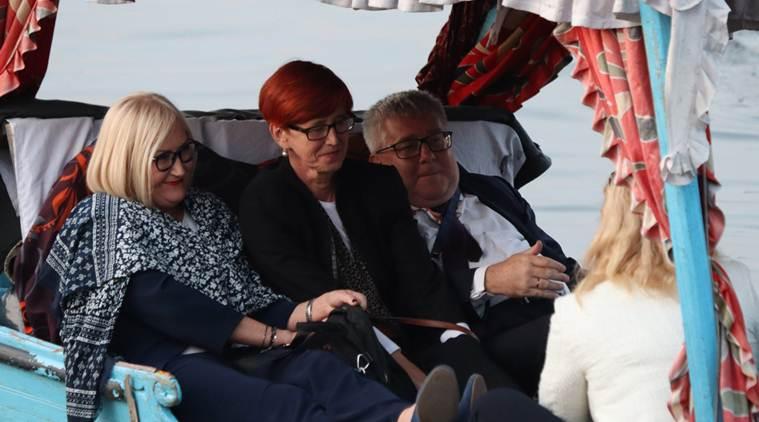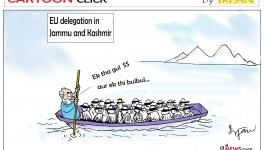Envoys’ Visit to J&K: One-eyed King in Kingdom of Blind

Image for representational use only.Image Courtesy : The Indian Express
Barring Norway, South Korea and the USA, India picked stragglers on global indices such as the Rule of Law Index and the Human Freedom Index, to take on a ‘guided tour’ of Jammu and Kashmir. Quite tellingly for India, it is among the worst even in this cohort of countries on the Press Freedom Index. Only Bangladesh (ranked 150), Uzbekistan (160) and Vietnam (176) are below India, which is ranked 140th among 180 countries in the ranking.
Except Norway, South Korea and the USA, the other 12 countries from the Caribbean, Africa, South-east Asia, Central Asia, and South America are truly India’s comrades-in-arms when it comes to upholding the law and basic freedoms such as the right to protest and communicate, including through the internet. A quick look at the table below makes it clear that when the spokesperson of the Ministry of External Affairs said that the government’s idea behind taking this group was to have a ‘global’ group of envoys to Kashmir, he was not referring to their track record on preserving rights, freedoms or the rule of law.
The government’s plan to showcase ‘normalcy’ in the state, particularly in the Kashmir valley, through this visit started on the wrong note. The ambassadors of countries belonging to the European Union declined to be part of this cohort, citing lack of unfettered access to meet ordinary Kashmiris at will. The MEA has tried to make light of this development and has said that the EU envoys will be taken to the state at a later date.
(Countries in green rank better than India) (Countries in pink rank worse than India)
Given that this was the first time the Indian government took an official delegation of ambassadors to Kashmir since the abrogation of Articles 370 and 35A in August 2019, after which it imposed an internet shutdown, it was clearly in India’s interest to ensure that the cohort of ambassadors is sympathetic to the government’s view rather than the plight of ordinary people in the conflict-ridden state. In October a group of EU MPs had visited Kashmir at the behest of a little-known private think-tank. The visit, which comprised of boat rides on the iconic Dal lake amidst a communication shutdown and the incarceration of the entire political and civil leadership of the Valley, had caused outrage both in India and abroad. Subsequently, the government tried to wash its hands off the trip by labelling it a ‘private visit’.
The Indian government has forgotten that taking countries that are themselves mired in suppressing basic civil and political rights is hardly fruitful when political leaders from the country have been disallowed from visiting the Valley or from meeting jailed politicians, some of whom, such as Mehbooba Mufti and the father-son Abdullah duo, are former chief ministers and Members of Parliament. The 82-year-old Farooq Abdullah, detained under the stringent Public Safety Act, is a sitting MP.
This visit has also drawn flak for cherry-picking the delegations that met the foreign envoys. Political renegades and BJP leaders, most of them greenhorns, were led by former state finance minister Altaf Bukhari at a lunch meeting with the foreign envoys. Bukhari was expelled by the People’s Democratic Party last year for anti-party activities. Similarly, only a handful of journalists were allowed to interact with the envoys under close scrutiny of the government.
After the visit, the Vietnam envoy Pham Sanh Chau, told the news agency ANI that “Seeing is believing. Kashmir is like Switzerland, and I would like Vietnamese people to visit there. The groups of people I met seemed happy with the situation.” Such is the utter absence of the resentment of Kashmiris in this statement that it would only be believed in Vietnam. Like the Kashmiris, the hardships under which they have been forced to live are being suppressed through internet lock-downs and other restrictions.
Last week, India’s Supreme Court chided the government for its “repeated use” of section 144 of the Criminal Procedure Code and for suspending internet services, following which the government has announced that hotels, hospitals, banks and government offices will be allowed access to broadband services, but there is no relief yet in sight for journalists in the Valley. Ever since 5 August 2019, when a total internet shutdown was imposed, journalists, particularly those working for news websites, have struggled to do their job. At the moment more than 300 journalists rely on the government-run ‘media centre’ where they can access the internet under the watch of government’s minders.
If indeed the government wanted to ward off criticism, both at home and abroad, of its undemocratic actions in Kashmir, it would have invited countries such as Malaysia, Turkey, China and European Union members such as France, or the United Kingdom, which recently left the EU. Instead, the government has encouraged Indian traders to cut down their palm oil imports from Malaysia, dismissed its criticism of India’s actions in Kashmir and labelled President Mahathir’s comments on the Citizenship Amendment Act, “factually incorrect”.
The presence of the US Ambassador Kenneth I Juster, touted as a ‘win’ was hardly a surprise, given the bonhomie between the Republican Party and Bharatiya Janata Party governments in the two countries. But soon after the visit ended the US State Department struck a note of caution by saying, “Closely following @USAmbIndia & other foreign diplomats’ recent trip to Jammu & Kashmir. Important step. We remain concerned by detention of political leaders and residents, and Internet restrictions. We look forward to a return to normalcy.”
The Norwegian envoy’s presence was more a balancing act after the controversy over the meeting between its former prime minister and Hurriyat leader Mirwaiz Umer Farooq in December 2018.
South Korea, the third other country which enjoys a decent human rights and freedom of expression track record, is a crucial trading partner with overall bilateral trade between the two countries around $20 billion.
To some extent, the visit has achieved the cynical and myopic aims of the government. It will allow the BJP to deflect the Opposition’s criticism at home and at the same time, it will be cited as proof of India’s efforts to manage its image well at the global stage. With the Supreme Court now taking up petitions with regard to Kashmir, the government’s efforts will be under greater judicial scrutiny, and here too, it will not be a surprise when this visit is used by the government to argue that things are indeed ‘normal’ in Kashmir.
By taking a majority of countries notorious for suppressing democracy and freedom to visit Kashmir, India has tried to act like a one-eyed king in the kingdom of the blind, but this will not help either Kashmiris or the Indian democracy in the long run.
The international spotlight shone on Kashmir once again on Wednesday when Pakistan and China managed to hold closed-door consultations with at least 15 nations. After the meeting, a senior Russian diplomat tweeted: “UNSC discussed Kashmir in closed consultations. Russia firmly stands for the normalisation of relations between India and Pakistan. We hope that differences between them will be settled through bilateral efforts based on the 1972 Simla Agreement and the 1999 Lahore Declaration.”
China’s UN ambassador Zhang Jun warned of “tensions” in the sub continent. He said UNSC members heard from a United Nations official about the “situation on the ground” and then “exchanged views” on the divisive issue.
Valay Singh is a journalist and author of Ayodhya: City of Faith, City of Discord. The views are personal.
Get the latest reports & analysis with people's perspective on Protests, movements & deep analytical videos, discussions of the current affairs in your Telegram app. Subscribe to NewsClick's Telegram channel & get Real-Time updates on stories, as they get published on our website.
















